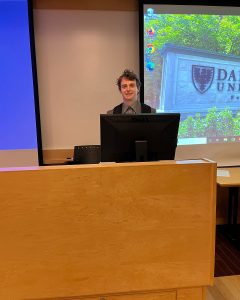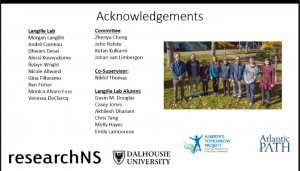Congratulations to Jacob Nearing who successfully defended his PhD in Microbiology and Immunology at Dalhousie University!! Supervised by Dr. Morgan Langille, Jacob used biosamples from Atlantic PATH and Alberta’s Tomorrow Project in his work, “Identification of Robust Biomarkers Using Microbiome DNA Sequencing with a Focus on the Oral Microbiome and Cancer Associations.”
Abstract
The human microbiome can be defined as the community of microbes that live within and on the human body. Modern day microbiome research relies on the use of high throughput deoxyribonucleic acid (DNA) sequencing to characterize and identify microbes and community structures associated with human disease. Indeed, the human microbiome has been proposed as a useful source of biomarkers for numerous human health conditions including cancer. Yet often, microbial biomarkers identified through DNA sequencing efforts are not reproducible between studies. Herein, I present my work on examining computation choices during microbiome experiments and applying this knowledge to identify novel associations with the salivary microbiome and breast, prostate, and colon cancer. Typical DNA sequenced based surveys of microbiomes, requires numerous choices to be made at each step of the experimental protocol. Often theses choices are unclear with no current gold standard within the field. Yet, these methods are used interchangeable within the literature without regard for how that choice might impact the biological conclusions that researchers find. To help address this issue I examined how choices made during two computational steps for processing DNA sequencing data impacted the biological conclusions drawn. In doing so I highlighted critical differences that can be attributed to bioinformatic tool choice and suggest potential solutions for these issues in the future. Using information from the above chapters, the second half of this thesis represents analysis done on salivary samples from a large population cohort to both characterized salivary microbiome variation and how that variation is associated with breast, prostate, and colon cancer. Within these chapters we show that several daily life factors are significantly associated with salivary microbiome composition, yet they only explain a small amount of total community variance. We also show that the salivary microbiome contains little signal in cases of breast and prostate cancer. Contrastingly our work did show potential salivary microbiome associations within cases of colon cancer. These findings show the potential for future diagnostic research into the relation between the oral microbiome and colon cancer development.
Jacob’s publications and additional information about his research can be found here.
Congratulations, Dr. Nearing!! We wish you all the best in the future and look forward to following your career.

Jacob Nearing’s PhD Defence, December 2022

